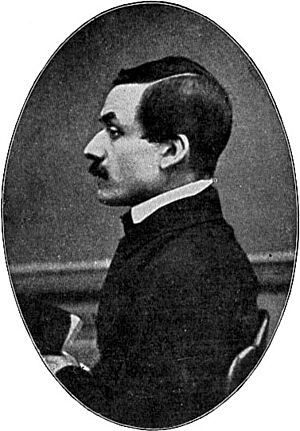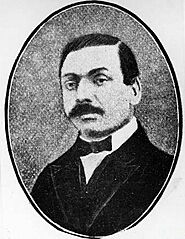İbrahim Şinasi facts for kids
Quick facts for kids
İbrahim Şinasi
|
|
|---|---|
 |
|
| Born | 5 August 1826 Istanbul, Ottoman Empire |
| Died | 13 September 1871 (aged 45) Istanbul, Ottoman Empire |
| Occupation | Journalist, poet, playwright, newspaper editor |
| Language | Ottoman Turkish, Turkish |
| Nationality | Ottoman |
| Notable works | The Wedding of a Poet (Turkish: Şair Evlenmesi) |
İbrahim Şinasi (born August 5, 1826 – died September 13, 1871) was a very important thinker and writer from the Ottoman Empire. He was a journalist, poet, and playwright. He helped create modern Turkish theater.
Şinasi changed many things in his time. He wrote one of the first plays in the Ottoman Empire. He also encouraged people to translate French poems into Turkish. He made the Ottoman Turkish script easier to read. He was one of the first Ottoman writers to write for everyone, not just for a small group of educated people.
Şinasi used his newspapers, Tercüman-ı Ahvâl and Tasvîr-i Efkâr, to share ideas from the European Age of Enlightenment. This was during a time of big changes called the Tanzimat period. He wanted to help the public learn more. Even though he died young, Şinasi started many important changes that continued after him.
He was also a leader of the Young Ottomans. This was a secret group of thinkers who wanted to modernize the Ottoman Empire. They wanted to make it more like Europe. Şinasi and his friend Namık Kemal worked hard for these reforms. Their efforts led to the first attempt at a constitutional monarchy in 1876. This meant the Empire would have a constitution and a parliament. Şinasi helped prepare people's minds for these big changes. His work influenced the future Republic of Turkey.
Contents
Early Life and Education
İbrahim Şinasi was born in Constantinople (now Istanbul) in 1826. This was a time of many changes in the Ottoman Empire. His father was an army captain who died in a war. Şinasi was raised by his mother and other relatives.
He started school to become a clerk for the military. He got a job at an armory. At the same time, he studied Arabic, Persian, and French. He became close with a famous reformer named Mustafa Reşid Pasha. This helped Şinasi get a government scholarship to study finance in Paris, France.
While in Paris, Şinasi also studied math, science, and history. But he grew to love literature the most. He learned about French literature and met French thinkers. He was very impressed by the ideas of the Age of Enlightenment. He became friends with important people like Lamartine and Ernest Renan. He also joined the Société Asiatique, a group that studied Asian cultures. During his time there, he translated several French works into Ottoman Turkish.
Working for the Government
Şinasi worked for the government for a short time. He was part of the Educational Committee. This group worked to improve Ottoman schools. He joined this group after returning from Paris in 1853.
He was fired from this job, then hired again, and then fired again in 1863. He was likely dismissed because he started writing for newspapers. He criticized the government and promoted "European" ideas. For example, he wrote an article supporting the idea of "no taxation without representation." This means people should not pay taxes unless they have a say in the government.
After losing his government job, Şinasi went back to Paris. He wanted to focus on his writing and language studies. Some people think he left because he had disagreements with other reformers.
Changing the Language
Şinasi's biggest contributions were through his use of language. Before him, Ottoman writing was split into two types. There was "elite literature" for educated people and "folk literature" for common people.
Elite writing was mostly poetry. It used a very formal Ottoman Turkish language. This language had many words from Arabic and Persian. Most common people could not understand it. This writing focused on being artistic, not on being easy to understand. Elite writers wrote for each other.
Şinasi changed this by making the language simpler. He wanted to reach more people who were learning to read. He also brought new types of writing from Europe. He tried to create a "pure Turkish" language. He wanted to remove words borrowed from other languages. This would make his writing easier to understand. When he died, he was working on a large Turkish dictionary. He also simplified the Arabic-based Ottoman Turkish script.
Journalism and Public Education
One of Şinasi's most important projects was starting the newspaper Tasvîr-i Efkâr in 1862. Its name means "Interpreter of Ideas." This was the first truly important newspaper in the Ottoman Empire. Before this, Şinasi had started another newspaper called Tercüman-ı Ahvâl with his friend Agah Efendi.
In these newspapers, Şinasi used a "journalistic Turkish." This language was closer to how everyday Ottoman Turks spoke. He strongly supported making the Ottoman Empire more like Western countries. He also believed in "encyclopedism." This meant he thought people should learn about many different subjects. His articles often mentioned famous thinkers like Plato or Newton. They also discussed important ideas like natural law.
In 1865, Şinasi joined the Young Ottomans and went to Paris. He left the Tasvir-i Efkâr newspaper to his colleague Namık Kemal. Şinasi later returned to Istanbul and died soon after.
Şinasi believed in freedom of expression. He used journalism to talk directly to the public and educate them. He thought that government actions were not just for the government to decide. He wrote that people have a right to share their ideas to help their country.
Literature and New Forms of Writing
Besides journalism, Şinasi was a poet, translator, and playwright. In 1853, he published a collection of poems called Divan-i Şinasi. Many people call him the "founder of the modern school of Ottoman literature." He earned this title because he changed Turkish poetry to be more like French poetry. He also translated many French poems into Turkish.
He showed people the importance of European literature. He said that a new Turkish literature would grow from Western ideas. His translations of poems and Enlightenment thinkers helped the Ottoman Empire become more Western.
The Wedding of a Poet
Şinasi's most famous work is probably his play, The Wedding of a Poet (Turkish: Şair Evlenmesi). It was not the very first play in a Turkic language. But it was the first widely known play written by an Ottoman person in a modern European style. It had a big impact on plays that came after it.
This one-act comedy was written in 1859 and published in 1860. It was printed in parts in his newspaper Tercüman-ı Ahvâl. This was because theater was becoming very popular in the Ottoman Empire. European acting groups were visiting from cities like London and Paris. This made people in places like Istanbul want more plays.
In this play, Şinasi used a Turkish language that was closer to how people actually spoke. He did not use the formal language of the educated elite. He even changed how he spelled words to make them sound more like spoken language. This also helped with performing the play.
This play was also new because it talked about current issues in a funny way. Şinasi used the play to criticize both old traditions and new ideas. He made fun of arranged marriages where the groom could not see the bride's face before the wedding. In the play, a young man falls in love with a beautiful woman. But her family secretly replaces her with her older, less attractive sister. The young man eventually gets his true love back. Şinasi also used humor to criticize the pride of some "intellectuals."
The play was likely meant to be performed at the Dolmabahçe Palace theater. The Şinasi Sahnesi theater in Ankara, Turkey, is named after him.
Later Life and Death
Şinasi returned to Istanbul in 1869. He lived a quiet life and had some money problems. He opened a printing house to print his own works. He died soon after, on September 13, 1871, at the age of 45. He passed away from a brain tumor.
Works
- Tercüme-i Manzume (1859, translations of poems from French writers like La Fontaine and Lamartine)
- Şair Evlenmesi (1859, "The Wedding of a Poet," the first Ottoman play)
- Durub-i Emsal-i Osmaniye (1863, the first book of Turkish proverbs)
- Müntahabat-ı Eş'ar (1863, a collection of his poems)
 | May Edward Chinn |
 | Rebecca Cole |
 | Alexa Canady |
 | Dorothy Lavinia Brown |


